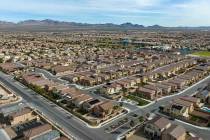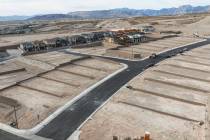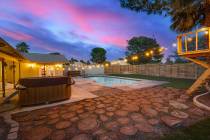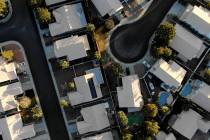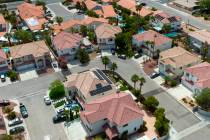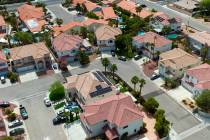Analyst says new-home prices will drop another 5 percent this year
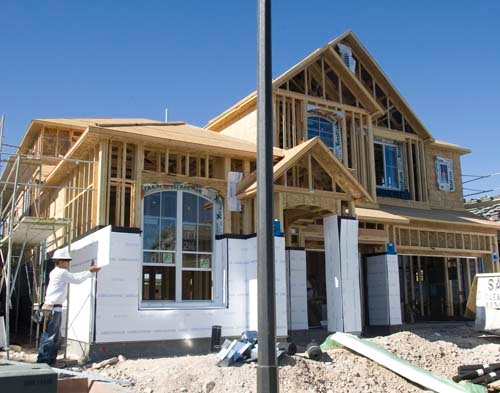

New-home prices will drop another 5 percent this year and stay essentially flat in 2011 as builders compete with more foreclosures and short sales, a Las Vegas housing analyst said Thursday at his quarterly presentation.
About half of new-home offerings are priced at $100 a square foot or lower, with floor plans by Harmony Homes going for as little as $65 a square foot in the master-planned Southern Highlands community, SalesTraq President Larry Murphy said.
Murphy had said in the past that prices couldn’t go much lower because it costs more to build a new home than what it would sell for.
“How low can it go? A year ago, I thought I’d never say this, but yeah, new-home prices could come down more this year,” he told about 80 real estate businesspeople at Crystal Ball.
SalesTraq reported a new-home median price of $182,440 in June, a 12.7 percent decrease from the same month a year ago. There were nearly 3,100 new-home sales in the first six months, compared with 2,300 in the year-ago period.
The resale median price has dropped 58 percent from its peak to $123,000 in June. However, it’s only down 2 percent over the last 14 months, so “the bleeding has almost stopped,” Murphy said.
Las Vegas could potentially see a flood of foreclosures by the end of the year, but probably won’t because lenders are reluctant to take back homes, Murphy said.
Short sales, or homes sold for less than the mortgage owed, are increasingly becoming the alternative to foreclosures, which are costly for banks to process and typically sell for less than a short sale, he said.
Murphy estimated a “shadow inventory” of 6,500 homes owned by the bank that have yet to be released on the market, plus 18,500 preforeclosure filings that may or may not go to foreclosure.
Even a shadow inventory of 25,000 homes is not that many, he said. Las Vegas had 24,067 foreclosures in 2008 and 20,426 in 2009.
The government’s loan modification program won’t work in Las Vegas because homeowners are too far “underwater,” or owing more than the principal mortgage balance. Homeowners need a 50 percent reduction in principal, and the banks just aren’t willing to do that, Murphy said.
Some 80 percent of Las Vegas homeowners are underwater and half of the homes have negative equity of 25 percent or more, according to First American CoreLogic.
That’s causing more homeowners to walk away from their mortgages, a phenomenon that’s become known as “strategic default.” Las Vegas leads the nation with a 16.2 percent mortgage delinquency rate.
“More people are delinquent on their home than they are on their automobile or credit card,” Murphy said. “In my day, you made your house payment first and then worried about the car. You can get on the Internet and learn how to do a strategic default.”
Realtor Steve Hawks said homebuilders are offering $20,000 price reductions and $10,000 broker commissions to lure buyers. Consumer traffic at new subdivisions has dropped 50 percent since the federal tax credit expired in April, he said.
“The tax credit helped the builders more than anybody, but it also caused a sucker’s rally for new homes,” Hawks said. “Everybody that bought new homes is now upside down about 20 percent or more from the real market. Unfortunately, the expiration of the tax credit has crippled the builders. They are scrambling right now.”
Las Vegas’ housing recession started with the subprime mortgage crisis and is now being fueled by 14.5 percent unemployment, real estate consultant Steve Bottfeld of Marketing Solutions said.
“The first phase was condo conversions and junk houses,” he said. “Now we’re evolving into the upper end. The second phase could be the force that puts upward pressure on prices. I agree we’re not going to see huge increases this year, but we could see them next year.”
Las Vegas needs to “blow up” about 10 percent of its housing stock to bring supply back in line with demand, Mark Boud of Irvine, Calif.-based Real Estate Economics said at Crystal Ball.
He also thinks homes are 58 percent undervalued in Las Vegas. About 12 cents of every dollar in household income goes toward mortgage costs, compared with 35 cents five years ago, Boud said.
“Las Vegas is a screaming deal, if you look at it,” he said. “It’s just hard to justify buying a home with such a high unemployment rate. Home prices are low not because of the job situation right now, but because of tight lending practices.”
Loan-to-value ratios, or the amount a bank will loan on a home, are still going down, which means banks are even tighter about giving loans, he said.
Contact reporter Hubble Smith at hsmith@reviewjournal.com or 702-383-0491.
TODAY | LAST WEEK30-year 4.54 | 4.56
15-year 4.00 | 4.03
MORTGAGE RATESHIT LOW
NEW YORK — Mortgage rates are the most affordable in decades for those who can qualify for a loan.
For many, the opportunity to buy a home or refinance at this time is lost because of the tough economy and tight credit standards.
But those who have secure jobs, superior credit and strong finances could do even better than the 4.54 average rate that Freddie Mac reported Thursday, according to a variety of experts.
The latest rate is the lowest for a 30-year fixed loan since Freddie began tracking rates in 1971. It also marks the fifth time in six weeks that the mortgage company has reported hitting a new average low.
THE ASSOCIATED PRESS









